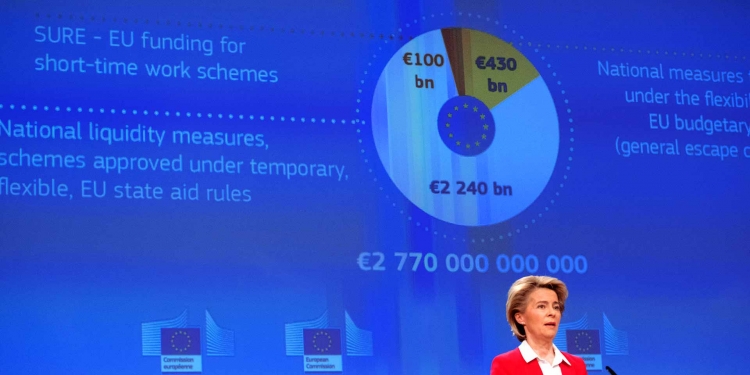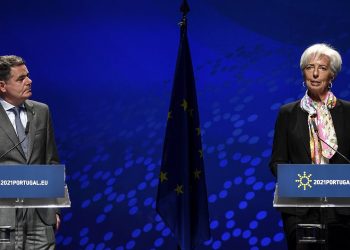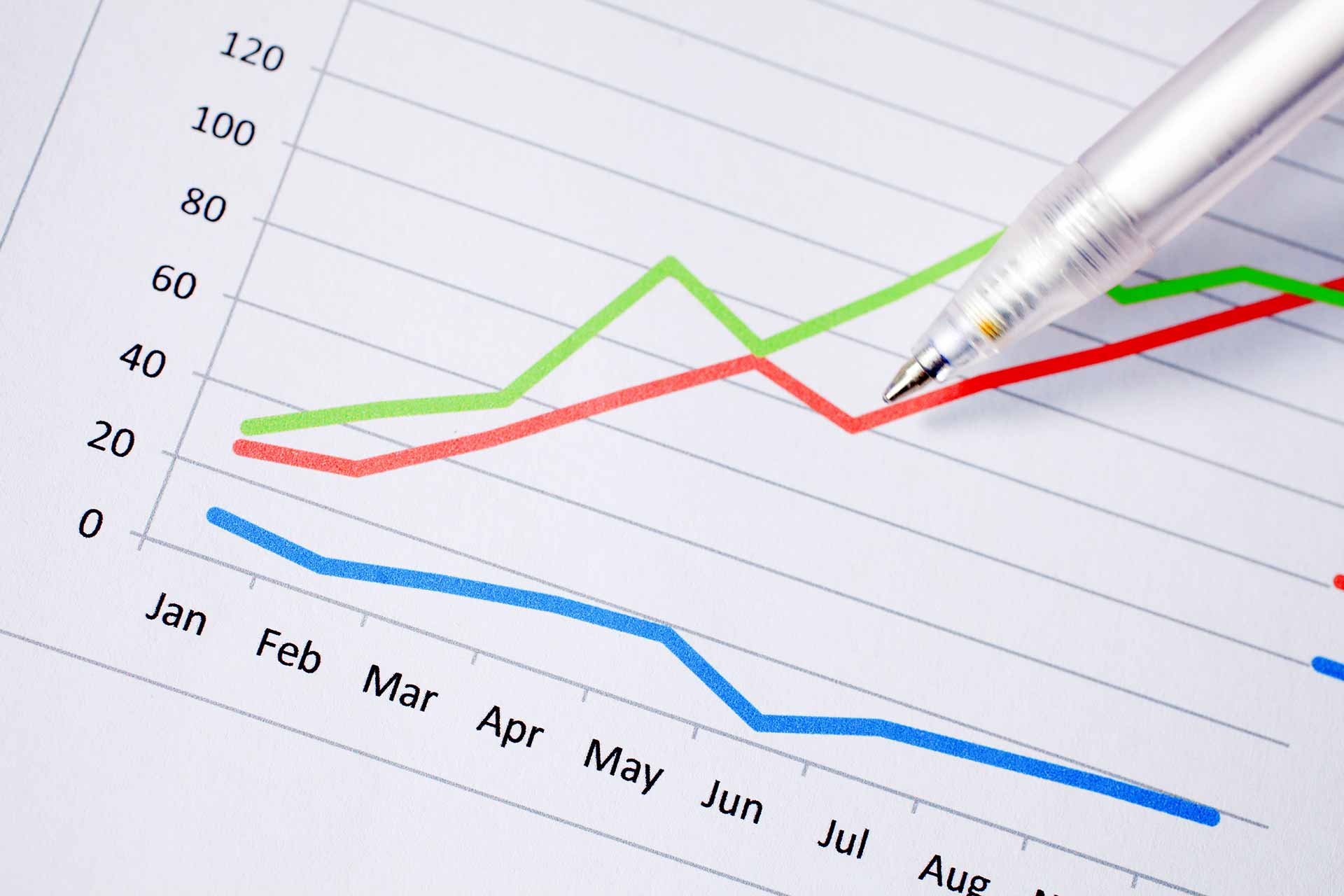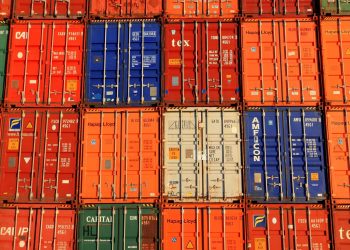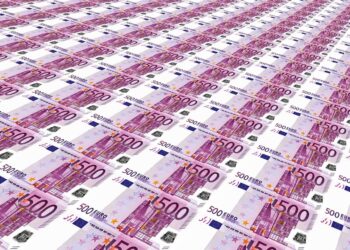The coronavirus outbreak is testing Europe. Saving lives and supporting livelihoods in these times of acute Coronavirus crisis is paramount. The Commission is further increasing its response by proposing to set up a €100 billion solidarity instrument to help workers keep their incomes and help businesses stay afloat, called SURE. It is also proposing to redirect all available structural funds to the response to the coronavirus.
President of the European Commission gave a press conference on three initiatives as a response to COVID-19 (coronavirus) crisis:
- SURE: the new instrument for temporary Support to mitigate Unemployment Risks in an Emergency (SURE) which is designed to help protect jobs and workers affected by the coronavirus pandemic;
- the European Union Emergency Support Instrument for the healthcare sector: the Commission mobilised €2.7 billion in order to support Member States to directly purchase or procure emergency support on behalf of Member States and distributing medical supplies such as masks and respirators; financially support and co-ordinate pressing needs such as the transportation of medical equipment and of patients in cross-border regions; and finally support the construction of mobile field hospitals;
- and the CRII+ (Coronavirus (COVID-19) Response Investment Initiative Plus) which completes the first Coronavirus Response Investment Initiative package by introducing extraordinary flexibility to allow that all non-utilised support from the European Structural and Investment Funds can be mobilised to the fullest.
EU announced largest EU support yet
President of the European Commission Ursula von der Leyen presented on 2 April a new set of EU measures to preserve Europe’s skilled workforce, the vibrant heart of the European economy.
€100bn Solidarity Instrument
One of the steps is a proposal to set up a EUR 100 billion solidarity instrument to help workers keep their incomes and help businesses stay afloat, called SURE. “SURE is Europe-supported short-time work. It can mitigate the effects of the recession, it keeps people in work, it enables companies to return to the market with renewed vigour”, von der Leyen explained, adding that the Commission will provide loans to those Member States that need them, to strengthen their short-time work schemes.
The Commission also proposed to redirect all available structural funds to the response to the coronavirus. Every available euro in the EU budget will be redirected to address the coronavirus crisis.
We must use every means at our disposal.
Ursula von der Leyen
“Every rule will be eased to enable the funding to flow rapidly and effectively”. She said this meant joining forces with Member States to save lives and protect livelihoods, and acting in solidarity.
Long-term Coronavirus Recovery
She reminded that the European institutions and Member States have to date mobilised EUR 2,770 billion, in what is the largest answer to a European crisis ever given. Looking ahead, von der Leyen also noted the need to start preparing for the long-term recovery. In that sense, she highlighted the European budget as ‘our strongest, our most important instrument’ that would have to embody our response to the coronavirus crisis.
EU budget will use every available euro
Farmers and fishermen will also receive support, as will the most deprived. All of these measures are based on the current EU budget and will squeeze out every available euro. They show the need for a strong and flexible long-term EU budget. The Commission works to ensure that the EU can count on such a strong budget to get back on its feet and progress on the path to recovery.
The coronavirus outbreak is testing Europe in ways that would have been unthinkable only a few weeks ago. The depth and the breadth of this crisis requires a response unprecedented in scale, speed and solidarity.
In the past weeks, the Commission has acted to provide Member States with all the flexibility they need to support financially their health care systems, their businesses and workers. It has acted to coordinate, speed up and reinforce the procurement efforts of medical equipment and has directed research funding to the development of a vaccine. EU has worked tirelessly to ensure that goods and cross-border workers can continue to move across the EU, to keep hospitals functioning, factories running and shop shelves stocked. European Commission has and continues to support the repatriation of EU citizens, their families and long-term residents to Europe from across the world.
EU Solidarity – Coronavirus
In doing this, the Commission is acting on its conviction that the only effective solution to the crisis in Europe is one based on cooperation, flexibility and, above all, solidarity.
Commenting on the proposals adopted, President von der Leyen said: “In this coronavirus crisis, only the strongest of responses will do. We must use every means at our disposal. Every available euro in the EU budget will be redirected to address it, every rule will be eased to enable the funding to flow rapidly and effectively. With a new solidarity instrument, we will mobilise €100 billion to keep people in jobs and businesses running. With this, we are joining forces with Member States to save lives and protect livelihoods. This is European solidarity.”
€100 billion to keep people in jobs and businesses running and fight Coronavirus crisis
What is Coronavirus Response Investment Initiative? How does it work?
SURE initiative
EU need to cushion the economic blow in order for the EU economy to be ready to restart when the conditions are right. To achieve this, Europe must keep people in employment and businesses running. All Member States have or will soon have short-time work schemes to help achieve this.
SURE is the Commission’s answer to this: a new instrument that will provide up to €100 billion in loans to countries that need it to ensure that workers receive an income and businesses keep their staff. This allows people to continue to pay their rent, bills and food shopping and helps provide much needed stability to the economy.
The loans will be based on guarantees provided by Member States and will be directed to where they are most urgently needed. All Member States will be able to make use of this but it will be of particular importance to the hardest-hit.
Short-time work schemes
SURE will support short-time work schemes and similar measures to help Member States protect jobs, employees and self-employed against the risk of dismissal and loss of income. Firms will be able to temporarily reduce the hours of employees or suspend work altogether, with income support provided by the State for the hours not worked. The self-employed will receive income replacement for the current emergency.
EU should use all means available in Coronavirus crisis
The European Union should mobilise all of its existing crisis measures in response to the coronavirus outbreak and come up with new joint mechanisms to finance the recovery, France’s finance minister said on Thursday.
These three instruments could be our common European framework to immediately face the economic crisis.
Bruno Le Maire
Bruno Le Maire said the European Stability Mechanism, the bailout fund with 400 billion euros ($436.8 billion) in firepower, should be made available as a source of financing to countries with only minimal conditions attached and without stigma for using it.
Delivering for the most Coronavirus deprived
Fund for European Aid to the Most Deprived
As most of Europe practices social distancing to slow the spread of the virus, it is all the more important that those who rely on others for the most basic of needs are not cut off from help. The Fund for European Aid to the Most Deprived will evolve to meet the challenge: in particular, the use of electronic vouchers to reduce the risk of contamination will be introduced, as well as the possibility of buying protective equipment for those delivering the aid.
Supporting fishermen and farmers
Europe’s farming and fisheries have an essential role in providing us with the food we eat. They are hard hit by the crisis, in turn hitting our food supply chains and the local economies that the sector sustains.
As with the structural funds, the use of the European Maritime and Fisheries Fund will be made more flexible. Member States will be able to provide support:
- to fishermen for the temporary cessation of fishing activities;
- to aquaculture farmers for the temporary suspension or reduction of production and provide support;
- and to producer organisations for the temporary storage of fishery and aquaculture products.
The Commission will also shortly propose a range of measures to ensure that farmers and other beneficiaries can get the support they need from the Common Agricultural Policy, for example by granting more time to introduce applications for support and more time to allow administrations to process them, increasing advances for direct payments and rural development payments, and offering additional flexibility for on-the-spot checks to minimise the need for physical contact and reduce administrative burden.
Protecting EU Economy and people with all available means
Redirecting all Cohesion Policy funds to fight the emergency
All uncommitted money from the three Cohesion Policy funds – the European Regional Development Fund, the European Social Fund and the Cohesion Fund – will be mobilised to address the effects of the public health crisis.
To make sure that funds can be re-directed to where they are most urgently needed. Transfers between funds as well as between categories of regions and between policy objectives will be made possible. Moreover, co-financing requirements will be abandoned, as Member States are already using all their means to fight the crisis. Administration will be simplified.
The Emergency Support Instrument
The European Union has not faced a health crisis in its history on this scale or spreading at this speed. In response, the first priority is to save lives and to meet the needs of our health care systems and professionals who are working miracles every day right across our Union.
Coronavirus – Mass Testing
Medical Research
New Treatments for Coronavirus
The Commission is working hard to ensure the supply of protective gear and respiratory equipment. Despite the strong production efforts of industry, Member States still face severe shortages. There is lack of protective gear and respiratory equipment in some areas. They also lack sufficient treatment facilities and would benefit from being able to move patients. Support will also be needed for mass testing, for medical research, deploying new treatments, and for producing, purchasing and distributing vaccines across the EU.
The EU proposed to use all available remaining funds from this year’s EU budget to help to respond to the needs of European health systems.
€3 billion will be put into the Emergency Support Instrument, of which €300 million will be allocated to RescEU. This will support the common stockpile of equipment. The first priority would be managing the public health crisis and securing vital equipment and supplies. The initiative includes ventilators, personal protective gear and mobile medical teams. Coronavirus medical assistance focuses on the most vulnerable and on those in refugee camps. The second area of focus would be on enabling the scaling up of testing efforts. The proposal would also enable the Commission to procure directly on behalf of the Member States.
Coronavirus in Europe
As the situation continues to evolve, EU Commission will come forward with more proposals. Commission works with all the other EU institutions to move forward as quickly as possible.

